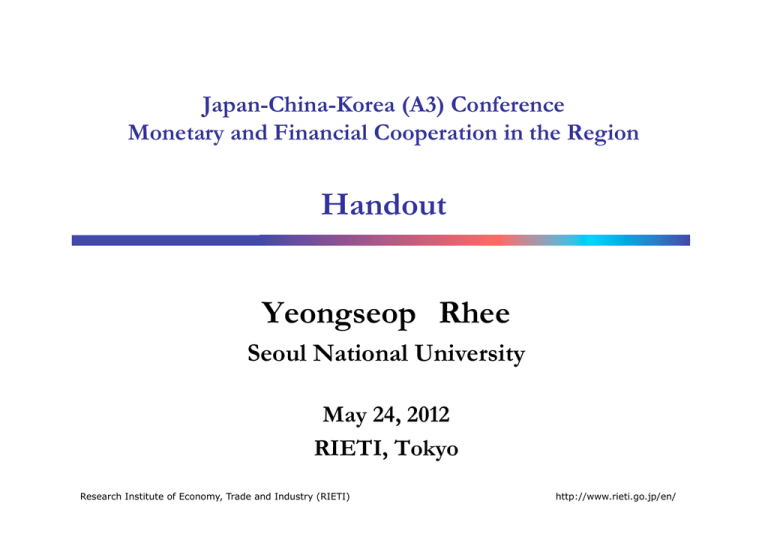Document 14027885
advertisement

Japan-China-Korea (A3) Conference Monetary and Financial Cooperation in the Region Handout Yeongseop Rhee Seoul National University May 24, 2012 RIETI, Tokyo Research Institute of Economy, Trade and Industry (RIETI) http://www.rieti.go.jp/en/ Comment on: Reasons and impacts of Euro crisis and implication to Asia (by Guoquiang Long) May 24, 2012 Yeongseop Rhee Contents • Summary – Causes of Euro crisis – Effects of Euro crisis – Policy suggestions for Asia • Comments – Causes – Suggestions for Asia 2 Causes • There are many contributing causes to the European crisis - The common basic cause is the monetary integration - Also, eventually the main cause took a form of public debt crisis • But underlying causes leading to the debt crisis are different among countries - One group . Chronic public problem – structural deficit - The other group . Real estate bubbles – sudden worsening of deficit 3 Causes • Chronic public problem and loss of competitiveness: Example – Greece - Too lax social welfare and endemic tax evasion, leading to chronic public deficit and CA deficit . Unit cost was relatively higher, leading further CA deficit - Under eurozone, borrowing cost dropped drastically: government used cheap credit to pay for public and CA deficits . Under eurozone, it was not possible to reduce competitiveness gap through exchange rate adjustment . Other measures such as wage reduction, fiscal restraint or technology improvement were not feasible either 4 Public pension schemes 5 Unit labor cost 6 Causes • Real estate bubbles: Example - Ireland - The Irish sovereign debt crisis was not based on government over-spending, but caused from the state guaranteeing main Irish-based banks who had financed a property bubble . The Irish economy expanded rapidly during the Celtic Tiger years (1997–2007) due to a low corporate tax rate, low ECB interest rates, and other factors . This led to an expansion of credit and induced a property bubble which petered out in 2007 7 Causes • Real estate bubbles: Example – Ireland (cont’d) - Irish banks, already over-exposed to the Irish property market, came under severe pressure in September 2008 due to the global financial crisis of 2007–2010 . On 29 September 2008 the government issued an unlimited bank guarantee in favour of 6 banks that was to cost much more than the government estimated, and fiscal balance drastically worsened - Under eurozone, preemptive restrictionary policy was not possible to calm down overheated bubble economy 8 Fiscal balance (% of GDP) 9 Public debt (% of GDP) 10 Policy Suggestions • Expansion of domestic demand (share) - Concept of “domestic” - Concept of “demand” 11 Policy Suggestions • Meaning of domestic - “domestic” usually implies the market within individual country . Then policy suggestion is reduction of openness . This may lead to support of protectionism - Interpret “domestic” as the market within East Asia region . Then policy suggestion is expansion of regional market . This can strengthen rationales of regional cooperation 12 Policy Suggestions • Scope of demand - “domestic demand” usually implies total spending by domestic residents . Then policy suggestion is increase of consumption and investment . This emphasized only the real side and may not provide suggestions to overcome the Achilles heel of East Asian region – financial weakness - “demand” must include not only real but also financial side . Then policy suggestion is increase of share of neighboring East Asian countries’ financial assets in their foreign asset holdings . This can strengthen rationales of regional financial cooperation 13 Outbound portfolio flows of East Asian countries 14


